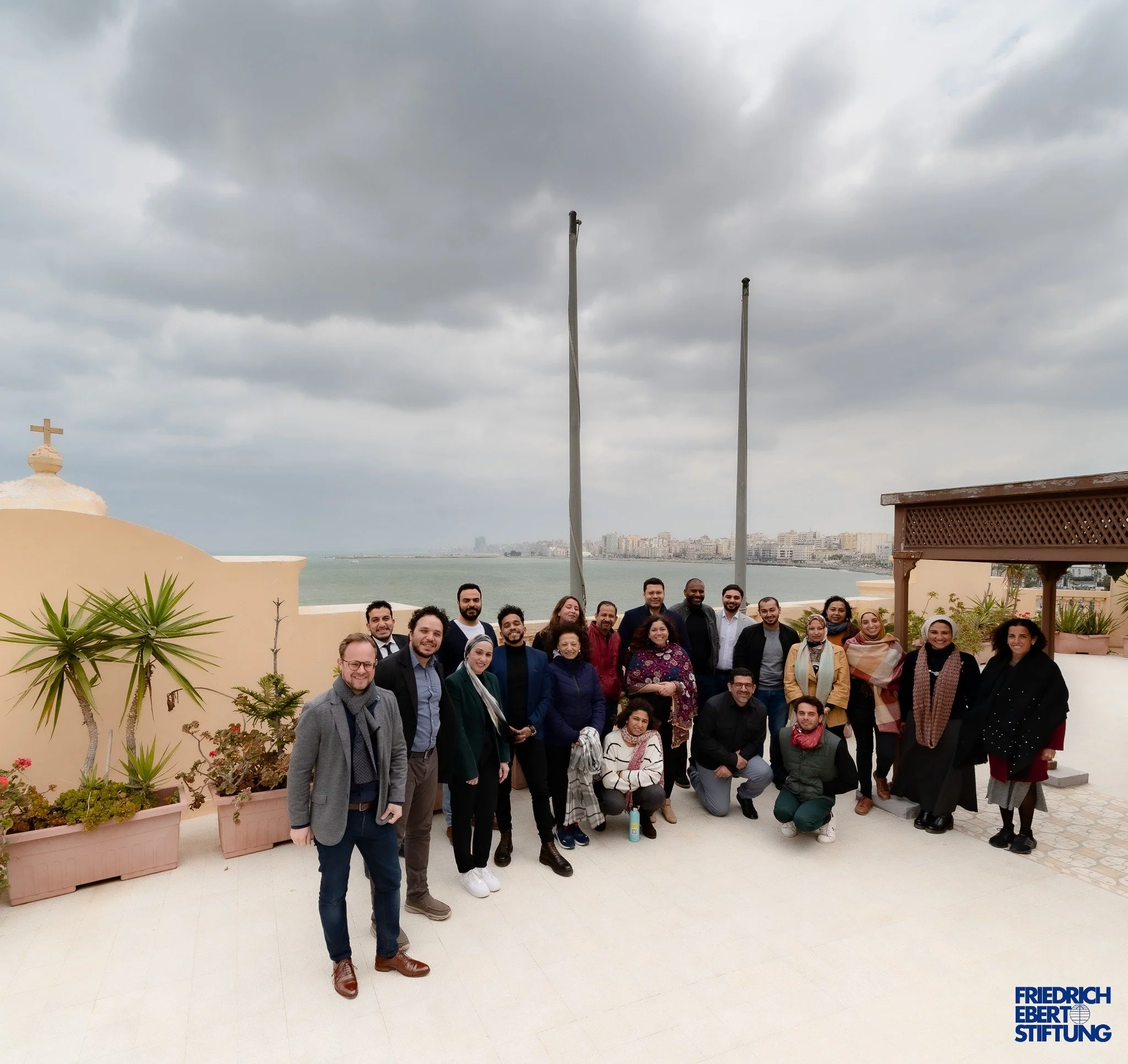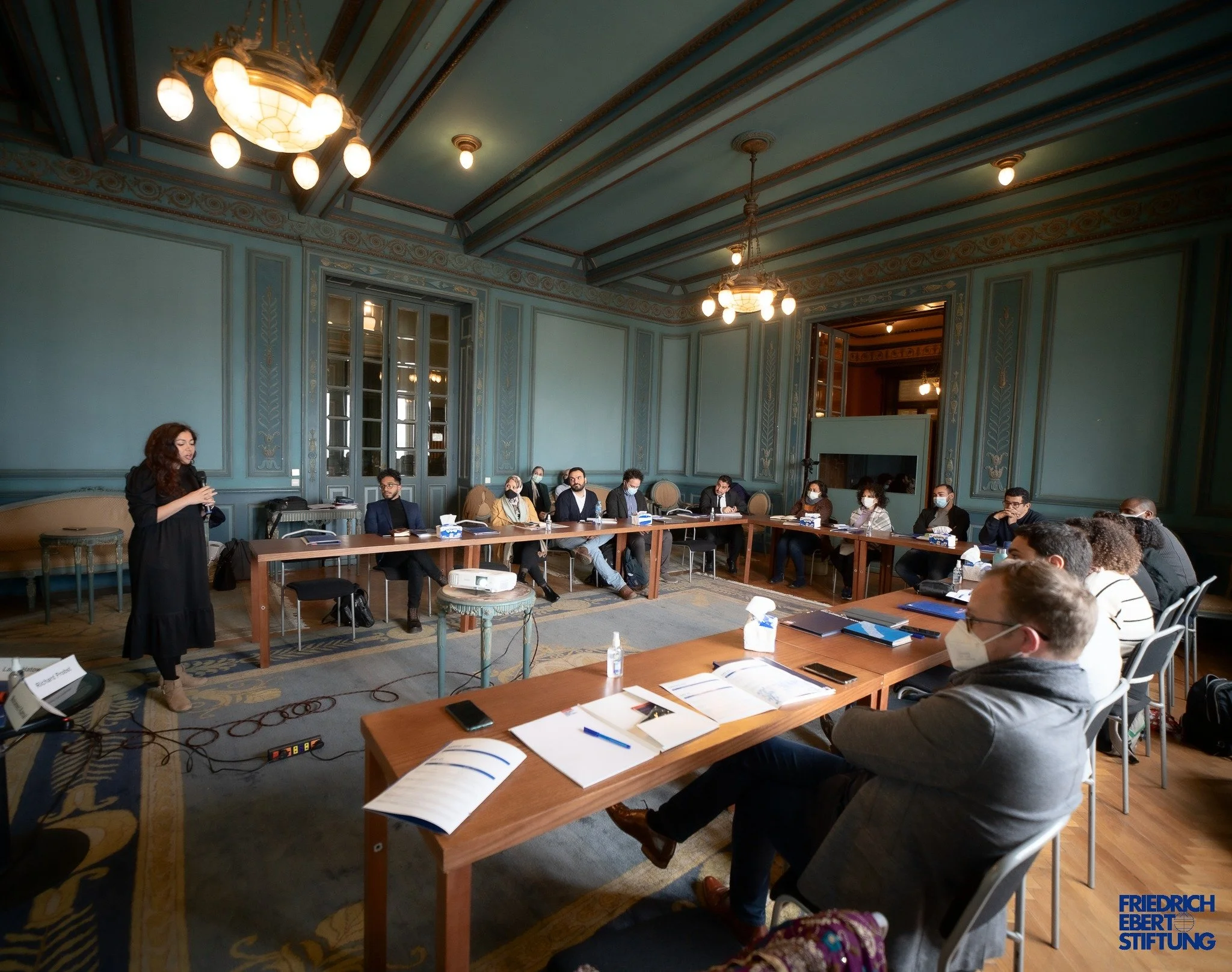How Can We Fight Against Climate Change?
The Anna Lindh Foundation house in Alexandria, with its stylistically distinct antique decorations and furniture, was the scene of a two-day workshop that equipped civil society organisations in Egypt with necessary information on climate change. Overlooking the Mediterranean sea, we found ourselves in an ideal setting to reflect on a topic concerning the environment. The workshop, organised by the Friedrich-Ebert Stiftung Foundation in Egypt in collaboration with Greenish and Kayan Foundation, hosted many participants from across the country in preparation for COP27 in Sharm El Sheikh.
Climate Preparedness Workshop. Source: Friedrich Ebert Stiftung / Egypt Office
So what exactly are civil society organisations? They are voluntary entities established by the people in the social sphere and independent from both the state and the market. These could vary from local initiatives to regional and international non-governmental organisations. At the workshop, some of the attendees included organisations focusing on environmental advocacy and awareness in general, the preservation of nature and cultural heritage, research, and mapping solutions related to climate change. It was a privilege to sit at a table alongside these voices from different backgrounds and hear their perspectives.
Climate Preparedness: What We Learned
The first day introduced the issues at hand. We learned about the science of global warming and the findings of the Intergovernmental Panel on Climate Change (IPCC). We were also given a guide to the international bodies and treaties related to climate change (e.g. UNFCCC, Paris Agreement…etc.) and a roadmap to COP and the expectations for COP27.
The main message? The importance of attaining the goal of 1.5°C global warming level. It was impossible not to feel the heaviness that overtook the room at the realisation that we, around the world, were not doing enough to mitigate the rising temperatures and what that could mean for our future. But then, a ‘Yippee’ suddenly interrupted the talk and the entire room burst into laughter. What we thought to be a misplaced exclamation turned out to be a phone ringing and a reminder to us to be optimistic. A positive note to end the day.
The following morning we listened to presentations on the actors and political groupings that attend COP, climate change in the specific context of Egypt and climate finance. It was a lot to wrap our heads around, so, to fully understand how these actors interact, we got to try out an exciting role-play game that helped us imagine how negotiations happen in the corridors of COP. We were divided into two groups. One group represented the civil society organisations that push for immediate and decisive actions to completely cut carbon and other greenhouse gas emissions. The other group acted as a government delegation that doesn’t want these efforts to disrupt its path toward development. Amidst the passionate defences from each side, one thing quickly became clear to us all: the importance of striking a balance between both sides. While every country does have the right to develop and secure its citizens’ welfare as governments would argue, it is also a universal duty to do this responsibly and sustainably to save the only planet these same citizens have.
The Key Takeaway from the Workshop: It’s Now or Never
What will the future look like? This is a question that the IPCC’s sixth assessment report, published in 2021, tries to answer. They predict five scenarios for the future based on how the world would control greenhouse gas (GHG) emissions over the next decades. The global surface temperature has reached 1.1-1.2°C over pre-industrial levels (1850-1900AD). And while temperature will keep rising until almost mid-century due to unprecedented carbon and other GHG emission levels the past decades, there is still hope. If we are to limit rising temperature to 2°C - ideally 1.5°C - by 2100, we could avoid unlivable heat levels, save the world’s biodiversity from enormous depletion and maintain food security. The first two scenarios explain how we can achieve this, but also highlight the responsibility that falls on us to reduce GHG emissions and air pollutants to half of where the levels currently are by 2050. One of the two scenarios even illustrates the need to cut carbon dioxide emissions specifically to net zero (see Table SPM.1 for temperature scenarios and Figure SPM.4 for targeted emission levels).
Table SPM.1: Changes in global surface temperature, which are assessed based on multiple lines of evidence, for selected 20-year time periods and the five illustrative emissions scenarios considered.” (IPCC AR6 Climate Change 2021: The Physical Science Basis, SPM, p.14)
Figure SPM.4, Panel (a): Annual anthropogenic (human-caused) emissions over the 2015–2100 period.” (IPCC AR6 Climate Change 2021: The Physical Science Basis, SPM, p.13)
At the beginning of the workshop, one of the facilitators who had attended COP15 in Copenhagen, Denmark in 2009 mentioned the fact that, at the time, not a single civil society organisation from Egypt was present. Thirteen years later, things have improved but it is still important to prepare civil society for the next COP in Sharm El Sheikh and the following one in the UAE, and to encourage their work on addressing climate change. These organisations play an important role in COP through talks with their government delegations and efforts to push for ambitious decisions every day of the conference. They raise awareness in their own countries and communities to combat adversities of climate change - at the end of the day, every individual effort matters to save our planet.
After the last discussion, I make my way to the balcony overlooking the Mediterranean and reflect on what I learned and what it means for us at RISE Egypt. Apart from the knowledge and insights we gained as individuals, this workshop was a reminder of how ecosystem-enabling work is needed to connect different stakeholders and innovators who work on climate change. This is why we are building a community that is supported by technology solutions through the LEEP for Collaborative Impact initiative. We want to maximise visibility, enable connectivity and facilitate collaboration in all the sectors and sub-sectors of the innovation ecosystem in Egypt, including climate change. I breathe in the sea air and marvel at the view ahead, knowing we are fighting to preserve it for generations to come.
*If you want to know more about COP, read our previous blog with our partner, Greenish, detailing their experience at COP26 in Glasgow, UK.
by Omar Serageldin, LEEP Program Manager at RISE Egypt




